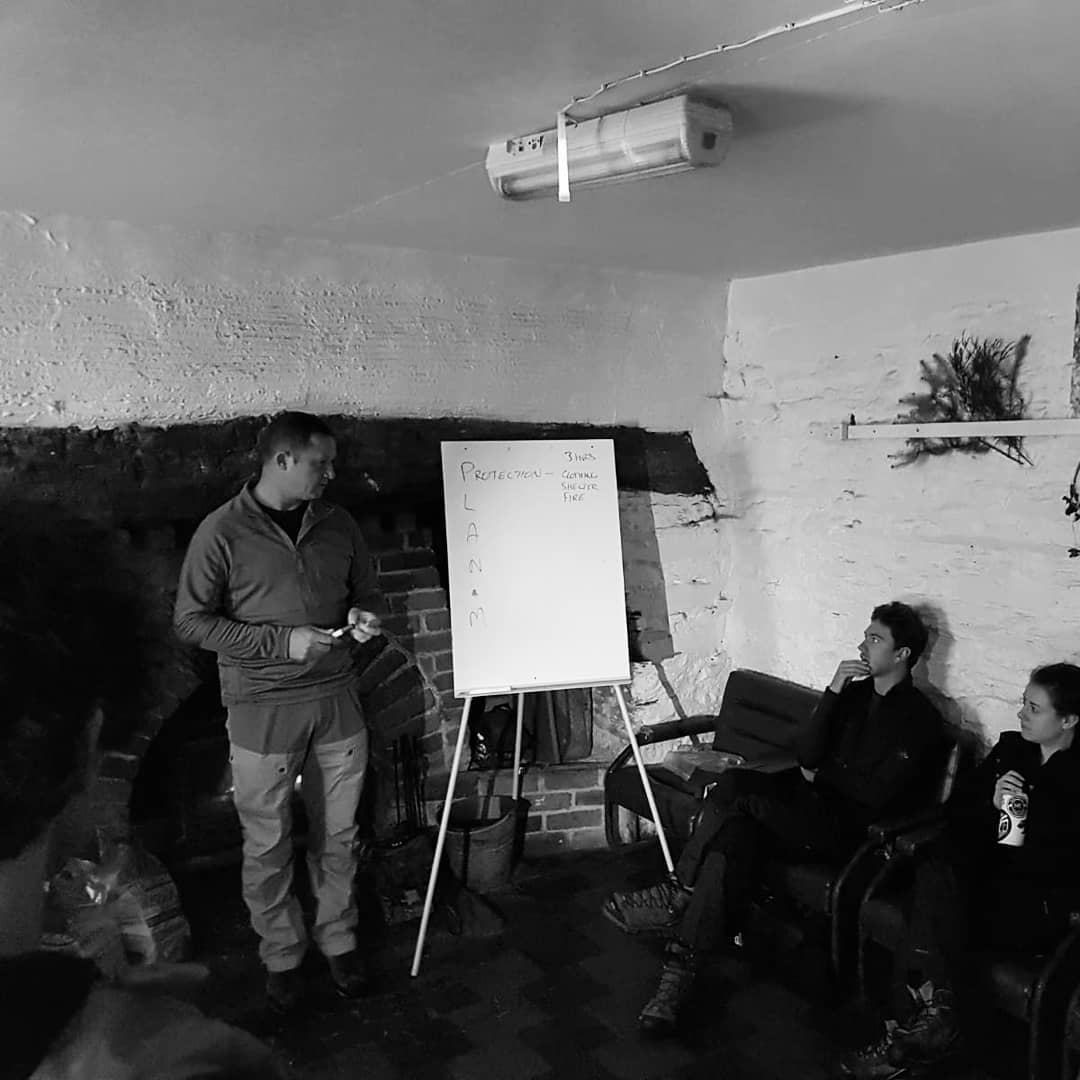
From anxious recluse to trier, speaker, author and, some days, trainee astronaut, Paula McGuire is the world’s least likely adventurer, with the world’s most inspiring adventure story. She joined us on a course recently and here’s some funny and honest observations!
No matter who you are – seasoned outdoorsman, eager enthusiast or, like me, just an idiot with borrowed waterproofs and an underdeveloped sense of mortality, I guarantee you’ll learn something on a Backcountry Survival course. Whether it’s adding to your navigation skills, developing greater awareness of the wild environment, or picking up something about yourself that you’d previously just stepped over, you’re bound to head home better equipped than when you arrived.
Over and above all that new knowhow though, there are a few added nuggets of knowledge that strangely aren’t mentioned in the course outlines. So I’ll mention them for you; here are the five most surprising things I learned on a Backcountry Survival course.
1. That a little of what you don’t fancy does you good
I won’t lie – guilt gives me acid reflux – I quite like being comfortable. Not wrapped in cotton wool exactly, but definitely at least draped with some. And, for at least 90% of my time on the BCS course, I was so far from my comfort zone I needed a small-scale map and a travel pass to find my way back. As always in life though, those moments when your mettle is tested are the most valuable for growth, and while I don’t think my mettle quite achieved an A-grade pass, I’m confident it was moved up a class by the experience.
 2. That you can survive almost anything on a tube of Primula
2. That you can survive almost anything on a tube of Primula
Who knew that a tube of squeezable cheese is not only a taste sensation (so I’m told) but also sustenance enough to fuel an entire day of breaking trail and shovelling snow? I’m not sure why the manufacturer has yet to promote this nutritional benefit but I imagine it won’t be long before a familiar face graces their adverts.
Please note: Primula is not at this time included on the essential kit list for BCS courses, but only, I suspect, since instructor Graeme has already depleted Scottish stocks of the product to below national shortage levels.
3. That you can give two healthy men palpitations with just one little finger
Hold on, before you get any ideas, it’s not that sort of course. But I have to say I was amazed by the effect I could have on my burly instructors with just the tip of my pinkie. Flinching, wincing, even the odd pained yelp – I could elicit all manner of reactions just by pointing a finger at a map. Yes, I know, you lose all navigational accuracy under the shadow of even the smallest digit, but surely it’s much more fun making grown men squirm than spotting a potentially life-saving exit route.
4. That tortoises have it tough
I’m a herpetoculturist. Wait, don’t go, it’s not contagious. What I mean is that I keep reptiles, with a particular penchant for tortoises – probably because they’re the only creature I have a hope of outpacing over 100 yards. But never have I felt such affinity with my shelled friends than on this course when, carrying what I can only describe as all my worldly belongings plus a snow shovel on my back, I fell over. If you have ever seen an upturned tortoise, struggling against its very nature to right itself, you can imagine my plight. If you haven’t, don’t fret, it’s not an entry requirement.
5. That good people can make any situation bearable
Whether it was Graeme’s constant chatter and incessant name-calling (Frodo, in case you were wondering) or Neil distracting me from the fact that I was carrying more weight than an amateur sumo by pointing out interesting features in the completely white landscape, the two instructors pulled me through the course more than just physically. I don’t doubt that they despaired at the fact that the only reason I was surviving their survival course was because they were holding my gloved hands through it, but their patience in the face of my complete lack of ability was unwavering. And, trust me, my lack of ability has quite a face on it.
Huge thanks to Neil and Graeme from Backcountry Survival for a wonderful day of winter-surviving.
Paula.
To find out more about Paula and the important work she does visit http://www.paulamusttryharder.co.uk/












 Great first day of our 2 day winter skills course looking at #navigation #iceaxe and #crampons #avalanche and #selfarrest techniques. Really glad we have a return to full on winter conditions in the #cairngorms as we’re back to back for two weeks!
Great first day of our 2 day winter skills course looking at #navigation #iceaxe and #crampons #avalanche and #selfarrest techniques. Really glad we have a return to full on winter conditions in the #cairngorms as we’re back to back for two weeks!














 ). Again it was an amazing experience, I will also send some pictures and feel free to use them where ever you want
). Again it was an amazing experience, I will also send some pictures and feel free to use them where ever you want . All the best and regards, Dirk.
. All the best and regards, Dirk. But even then, fuck it, it was well worth it. Thanks again guys, all of you Jelmer
But even then, fuck it, it was well worth it. Thanks again guys, all of you Jelmer












 Message an Instructor now
Message an Instructor now